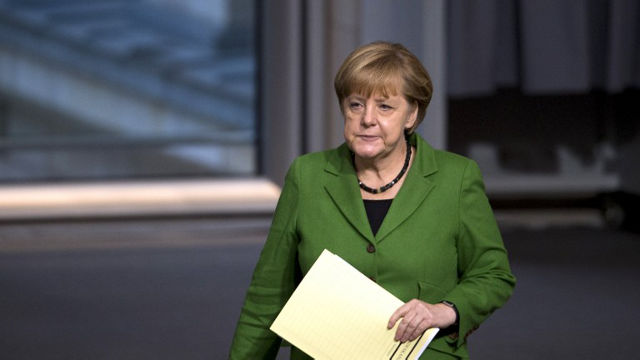SUMMARY
This is AI generated summarization, which may have errors. For context, always refer to the full article.

BERLIN, Germany – German Chancellor Angela Merkel called Monday for answers over “grave” US spying accusations which, she said in a speech to parliament, were testing transatlantic ties, including fledging trade talks.
Ahead of a special debate on US secret-service snooping on German soil which included her mobile phone, Merkel kicked off a statement to parliament meant to tackle another issue by addressing the US espionage claims.
“The transatlantic relationship and therefore also the negotiations for a free-trade agreement are presently without doubt being put to the test by the remaining accusations against the US and the collection of millions of data,” Merkel told MPs.
“The accusations are grave. They must be explained and, more important still for the future, new trust must be built,” she said to applause.
Merkel, who went on to speak about EU partnerships with Eastern European nations, did not directly mention the surveillance of her phone.
But she stressed that the relationship with the US was of “paramount” importance for Germany and Europe.
Lawmakers called a special parliamentary debate on the revelations that have put the US in the firing line and strained diplomatic ties, also casting a shadow over EU-US talks on what would be the world’s biggest free-trade accord.
Merkel was not due to speak during the debate but was expected to face tough questions from opposition MPs, who have denounced the government’s response as “feeble” until evidence emerged that the chancellor herself had been a target, reportedly since 2002.
With US President Barack Obama’s June visit to Berlin still fresh in many minds, deputies will examine the impact on US-German ties of sweeping surveillance, revealed in leaked US National Security Agency (NSA) documents.
And they will likely hear calls for Germany to grant asylum to Edward Snowden, the former NSA contractor who is behind the leaks that have fed near-daily media reports for months and is wanted in the US on criminal charges.
Hans-Christian Stroebele, a veteran Greens party MP who recently met Snowden in Russia where he has temporary asylum, said Germany owed the US fugitive not only thanks but a safe and permanent residence.
“Granting him asylum wouldn’t be about revenge or retaliation for spying on us. It would be a decision based on our fundamental values — and a moral duty,” he wrote in a New York Times editorial.
Snowden viewed as ‘hero’
Interior Minister Hans-Peter Friedrich has said that the government is studying the possibility of questioning Snowden in Russia.
But Berlin has already rejected a bid for asylum on the grounds that any applicant must be in the country.
After the evidence about Merkel’s phone, German spy chiefs headed to Washington for talks with US officials, including on a No-Spy Agreement.
A poll showed earlier this month that Germans’ trust in the US had taken a battering in the wake of the spy revelations, with 61 percent saying Washington was not a partner that can be trusted.
While opinion was divided over whether Germany should offer Snowden political asylum, a majority said they viewed him as a hero.
The survey followed an acknowledgement by US Secretary of State John Kerry in a German newspaper that “tensions” had arisen between Berlin and Washington over the revelations.
Germans’ anger that emails, phone calls, web searches and other data may have been hoovered up under the NSA programme overshadowed Obama’s long-awaited trip to Berlin.
With memories of the methods employed by the Nazis and East Germany’s communist regime still very much alive, Germans are especially sensitive to the issue of state surveillance.
Ahead of September’s elections, the government sought to play down the scandal.
But a revelation last month that Merkel’s communications were also monitored prompted her to confront Obama by phone, followed, in a highly unusual move, by the US ambassador to Berlin being summoned.
Stroebele hit out at the government for failing to protect its people. “For months, it has only reacted submissively and feebly to the United States,” he wrote. – Rappler.com
Add a comment
How does this make you feel?
There are no comments yet. Add your comment to start the conversation.